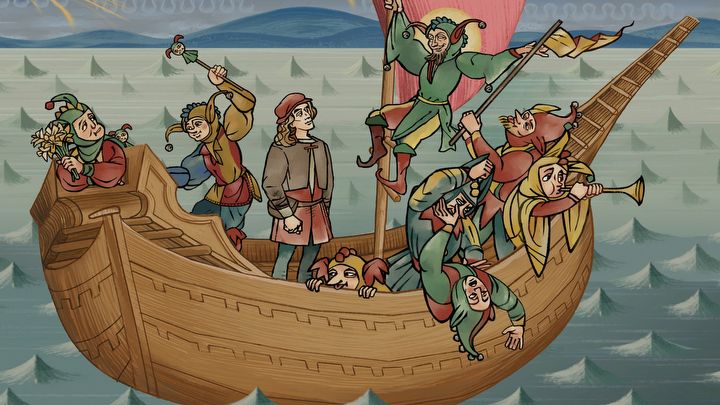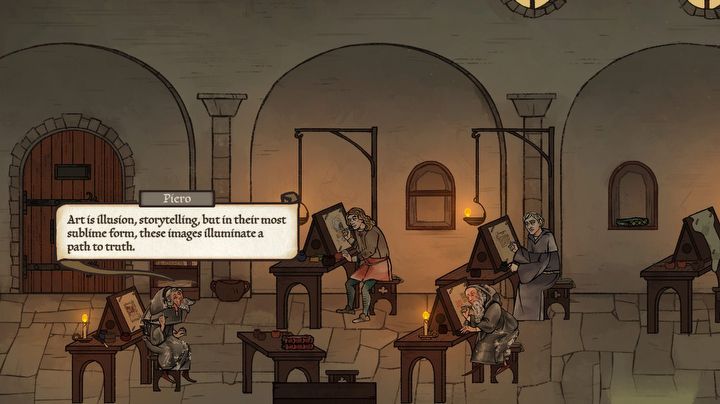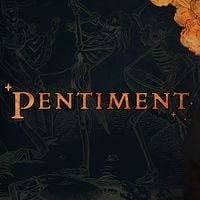''I Wouldn’t Mind Making Another Historical Game.'' We Talk to Pentiment Director
Pentiment is one of the biggest surprises of the past year. The big company released a seemingly small title and didn't quite count on commercial success. More about Obsidian's gem is told to us by the game's director, Josh Sawyer.
4
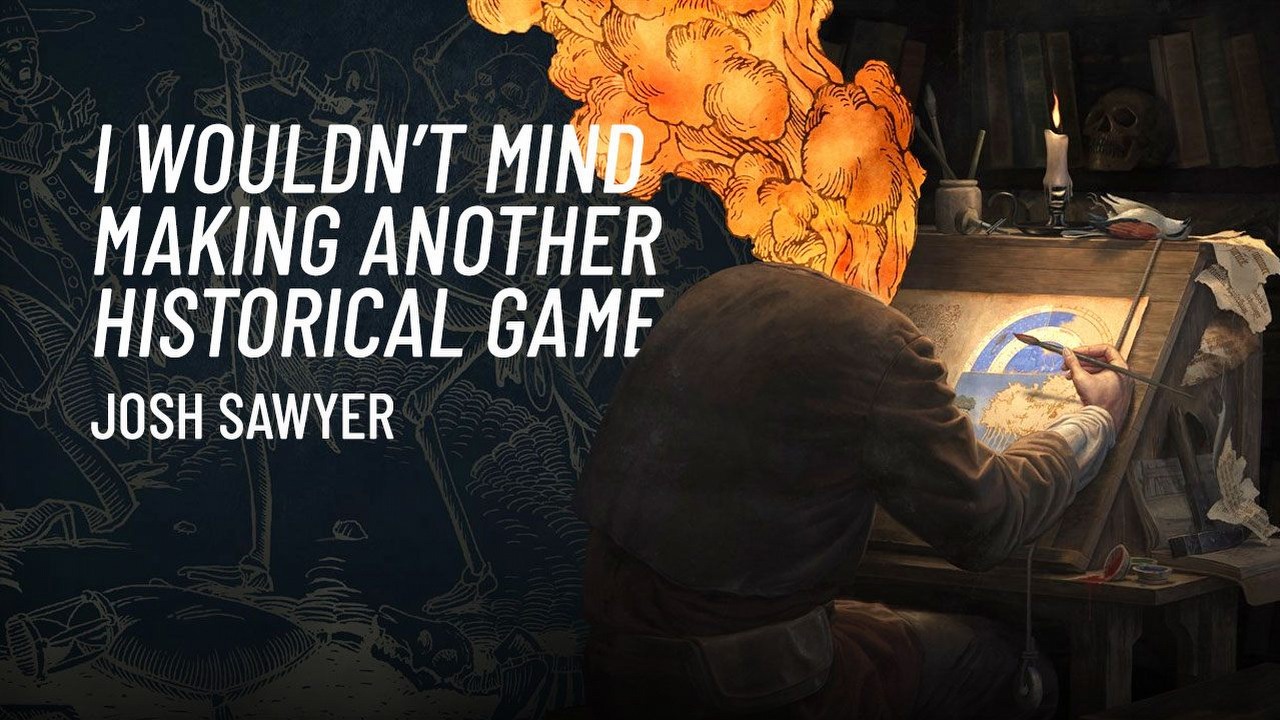
Pentiment turned out to be not only one of the best premium indie games of 2022 and the most original adventure in a long time, but also a veritable mine of knowledge. Knowledge about late medieval times, the art of the days, the culture of that life, the relationship between the Church and the peasant class. A complete niche, but if anyone’s into it, they will be stoked.
So, I'm even more pleased that Obsidian Entertainment gave us the opportunity to ask questions to the father of the entire project, Josh Sawyer. He is a true industry veteran, active in the profession for over 24 years; a titan of the RPG genre. He designed Icewind Dale and Neverwinter Nights 2 series, directed Fallout: New Vegas (but has long since grown tired with questions about that game) and both installments of Pillars of Eternity, and recently decided to take a bit of a breather, step aside and get busy with slightly smaller productions. That’s how Pentiment was made – a marriage of passion, large ambitions and limited efforts (more than a dozen developers worked on the whole).
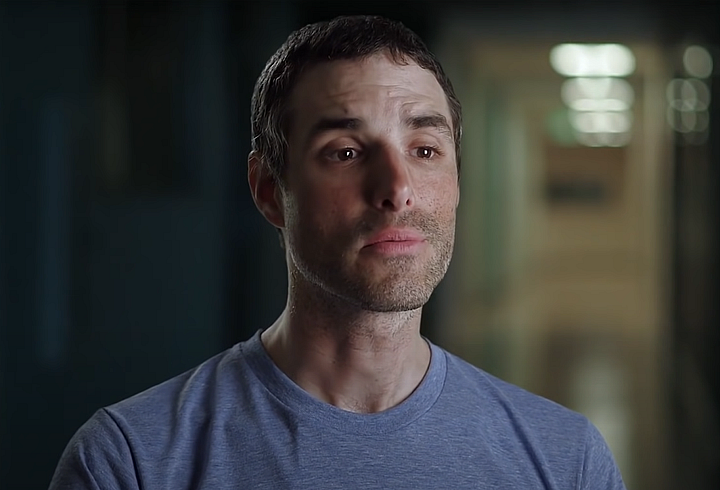
Gamperessure: Pentiment has been chosen the best Xbox game in our editorial poll for the game of the year. This is a big result, considering that it’s usually mainstream titles that lead the way, and Pentiment, let's face it, hits a very niche tone. Weren't you worried that the realistic medieval theme might prove too hermetic and alienating for players?
Josh Sawyer: I was not worried about that because I always assumed the audience would be small! The team that made Pentiment is much smaller than the teams for The Outer Worlds or the Pillars of Eternity games. We were never concerned with the game having mass appeal.
Interesting, huh? For it appears that the niche nature of the topic did not occupy the minds of the developers. We live in a time when it seems that the measure of success is the popularity of the game and the money earned from it. In the case of Pentiment, it was different. What mattered was the idea itself, the desire to create something unique, and after all, all this was happening within the structures of a serious studio, Obsidian, and a giant publisher, Microsoft. Sawyer himself, however, admitted in earlier interviews that the project would not have had the right to exist if it wasn’t for Xbox Game Pass. The platform gave space to authors of slightly more specific products.
Okay, so there were opportunities, money and a target platform. But where did the idea come from to create a game so deeply rooted in history? How did a group of Americans became so interested in the theme of medieval Eastern and Central Europe, marginalized in modern pop culture?
JS: I’ve been interested in medieval and early modern Europe since high school. That interest deepened in college when I pursued a degree in history. It overlapped with my interest in genealogy, since my family came from Germany, Austria, and Hungary.
I think trying to gain a more comprehensive understanding of early modern history helped elevate the importance of Poland, Bohemia, and Hungary in my mind. They were very powerful kingdoms from the 14th to 16th centuries and I thought their influence should be represented in Pentiment.
GP: Why are there so few realistic historical games? Is it the medieval reality that is difficult to translate into gameplay, or maybe it is the game developers who lack imagination or knowledge of how to show it in an interesting way?
JS: I think a lot of people shy away from history because they assume it’s all dry and inherently less interesting than fiction. Some of that comes from how people taught them history and it leaves them with a bad impression. I also think that medieval fantasy has blended into the public’s perception of medieval history so much that it can be hard to separate what’s pop culture from our actual historical records. It’s also easier to recreate things we’ve seen before in medieval fantasy in terms of gameplay and representation than it is to do some deep digging and create something that seems fresh – even if it’s only because it’s more historically grounded.
It's partly a matter of the education system, partly a matter of all sorts of media – but we've become accustomed to equating history with boring lessons full of dates and facts, and the trauma of world wars. There’s a lot of value, knowledge, as well as pop culture and genre potential here, which were all cleverly exploited by Sawyer and company. It may not sound very interesting on paper, but if it turns out that origin influences the shape of conversations with characters and the choice of dialogue options, it already turns out that it's possible to pair national or ethnic trifles with in-game mechanics. And that's already fresh. Anyway, this is not the only such attempt to reach into the past (and lesser-known parts of it) and implement it within an RPG adventure game:
GP: In addition to depicting the everyday life of peasants or the relationship of the common people with the church, you were not afraid to touch on less exploited themes related to the Middle Ages in the pages of history. We can find feminist motifs in the role of nuns in the church hierarchy, or love themes such as a homosexual relationship within the order, or a relationship that leads to breaking the rules of celibacy and then breaking out of the church altogether. How important was it for you to show this less obvious, but still very important side of moral life in the days of yore?
JS: It was very important, because I think it’s too easy to lose nuance in the representation of another time and place. You can look at centuries of European history and assume that because the Catholic church was in power, because society was patriarchal overall, that their power was absolute and that things like same sex relationships or feminist voices simply didn’t exist. We know that isn’t true, but we also know it takes more effort to represent how those people would have lived and survived in communities that were ostensibly quite hostile to them.
GP: In the game, we noticed a reference to the Martin Guerre case from the 16th century. What other such tidbits are there in the game that you are particularly pleased with?
JS: Martin Guerre is the most obvious reference, but we also reference the heresiarch miller Domenico Scandella (“Menocchio”) in the Romani tinker, Vácslav. Many of the details of the Act I executions are pulled from records like those associated with Frantz Schmidt in The Faithful Executioner. The heretical book Illuminata wants you to return is The Mirror of Simple Souls by the Beguine mystic Marguerite Porete. The necromancy text Guy is fooling around with in Act II is the Munich Manual of Demonic Magic, a historical text explored by Richard Kieckhefer in his book Forbidden Rites. There are many other less prominent historical references, as well as the references to fictional works like The Name of the Rose, Brother Cadfael, and Andrei Rublev.
This painful chain of dependencies in the form of peasants oppressed by the abbey (then peasants retaliating with a bloody uprising), the abbey under the whip of the state and nobility, foreigners trying to adjust to the hermetic community or liberal members of various right-wing structures makes Pentiment a very unusual, but also very faithful reproduction of the realities of the time. And the veracity of this world is proven by all the formal messages or literary works cited by Sawyer. This is how this world looked like, and despite the predominantly fictional story, a lot can be learned from it about history. And we would like to see more games like this one. Is there a chance for them?
GP: Pentiment came out a few months ago – you've certainly heard a lot of comments about the game. Looking back, is there anything you would change about it?
JS: I think it might be nice to rebalance some of the more confusing dialogue checks or to expand the ending sequence, but overall I’m quite happy with how things turned out.
GP: Is there any chance of another historical game from Obsidian? Or can we expect more Pentiment-like games, but set in different historical periods?
JS: I certainly wouldn’t mind making another historical game, but thankfully I have a little while before I need to propose a new project to work on. I would only work on another historical game where I really felt like I both had a good grasp on and a deep passion for the period and the people in it.
So, I'm glad that the discussions inside our editorial team about Pentiment weren’t idle, and many thoughts about the depth of the game and the amount of subject-matter preparations done by the developers for the medieval theme found their confirmation in the words of the main author of the whole project. So, if critics' reviews or players' opinions still haven't convinced you, maybe this conversation will make you finally try the game. Because Pentiment is not only the best game in a weak Xbox year. It's a work that will forever remain the source of a slew of historical and cultural tropes, and a contribution to expert analyses. A demonstration of creative power and diligent work.
4

Author: Karol Laska
His adventure with journalism began with a personal blog, the name of which is no longer worth quoting. Then he interpreted Iranian dramas and the Joker, writing for cinematography journal, which, sadly, no longer exists. His writing credentials include a degree in film studies, but his thesis was strictly devoted to video games. He has been writing for Gamepressure since March 2020, first writing a lot about movies, then in the newsroom, and eventually, he became a specialist in everything. He currently edits and writes articles and features. A long-time enthusiast of the most bizarre indie games and arthouse cinema. He idolizes surrealism and postmodernism. He appreciates the power of absurdity. Which is probably why he also tried soccer refereeing for 2 years (with so-so results). He tends to over-philosophize, so watch out.
Latest News
- Elite Mod lets you play the Tau faction in Warhammer 40K: Dawn of War 2
- Huge Marvel Adventures mod now with new superheroes, including Sentry
- Butcher's Summit, an impressive free diselpunk FPS, has been released
- Free FPS on Half Life engine gets big update
- On February 3, gaming history could change forever. Red Dead Redemption 2 one step away from a major achievement
